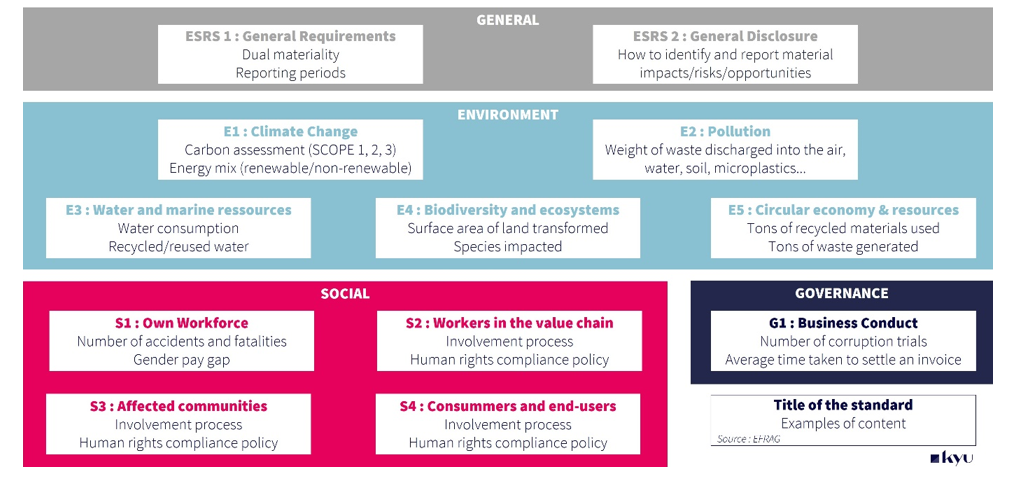
1- CSR reporting and the new European regulations
Since its adoption in 2022, the CSRD (Corporate Sustainability Reporting Directive) has been the European Union’s new compass for CSR (Corporate Social Responsibility) reporting. The aim of this new standard is to standardise the form and content of non-financial reporting by companies in order to increase their transparency.
The first companies to be affected by CSRD are large companies listed on the European market, with more than 500 employees and either a balance sheet total of more than €25 million or a turnover of more than €50 million. From 2025, these companies must publish their CSRD reporting for the 2024 financial year.
This first CSRD reporting will be based on the standards imposed by the European Union, the ESRS (European Sustainability Reporting Standards), based on the 3 pillars of CSR (Environment, Social and Governance) and covering 12 themes :

2024 is therefore a pivotal year for the companies concerned by these new reporting challenges. In particular, the CSRD campaign involves collecting and consolidating more data than ever before. In addition, companies need to think about the structure of their reporting campaign, to enable data to be consolidated at relevant levels, particularly for future audits.
2-Using the right tools
Faced with the complexity generated by these new reporting requirements, it is necessary to have a tool that is adapted to facilitate the collection and consolidation of large volumes of data, heterogeneous in nature and coming from a variety of internal and external sources, as well as its traceability, its historical record and the automation of the production of indicators and other dashboards.
While some companies already have reporting software, they may be confronted with the ageing and limitations of their current platforms in terms of functionality or user interfaces that are more or less ergonomic for integrating these new requirements.
Among the expected functionalities, we can list :
- Sending questionnaires to employees from the tool
- Integration of a dedicated space for stakeholders/partners or dedicated questionnaires
- Produce a report based on a regulatory model (GRI, CDP, etc.)
- Create and extract graphs and tables based on specific data and perimeters
- Comparison with data from previous years
- Modelling of future carbon emissions according to given scenarios
Solutions exist to manage the collection and consolidation of data and the automation of reporting, but the market is not yet mature but is developing rapidly. Among the tools available, there are two distinct profiles of publishers.
The first are the well-known ERP and reporting software publishers, who often already specialise in financial reporting. These platforms offer a large number of pre-developed functionalities and benefit from substantial investment in future-oriented areas such as AI.
The second are the CSR ‘pure players’, represented in particular by start-ups and medium-sized organisations. These solutions are designed specifically for the business needs of CSR reporting, opening up a wide range of customisation options and new functionalities.
3-Supporting you throughout the project
KYU Associés is an independent management consultancy specialising in operational performance, risk management and the sustainable transformation of organisations.
Faced with the new CSR reporting requirements, our teams support companies in all sectors from the definition of their strategy to the choice and deployment of the solutions best suited to their context, challenges and ambitions:
- Definition of requirements: analysis of existing tools and environment, monitoring and benchmarking of solutions that can meet requirements, drawing up specifications and shortlisting potential publishers;
- Selecting a solution: organising the RFI and RFP phases, leading the consultation process, Proof of Concept testing, choosing an integrated or best-of-breed architecture;
- Deployment and change management: Project management and PMO for the integration project, testing, training and support for teams.
Contact us:



